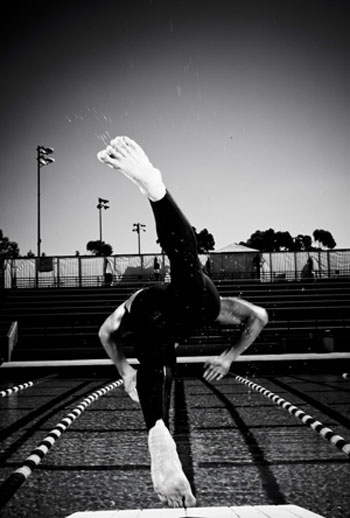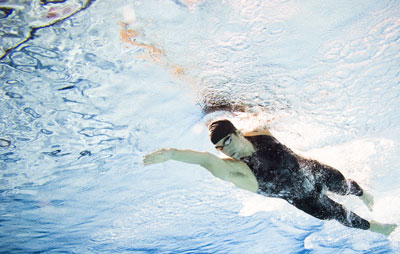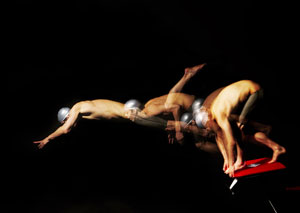COACHES' PHILOSOPHY
The coaches have developed nine equally important tenets for their philosophy.
1. Hard Work.
All swimmers must invest their time and effort into the sport and swimmers will be challenged accordingly. Success in competition is the direct result of how much work each individual puts into it. Similarly, there are no shortcuts for a coach or a swimmer. Consistent and persistent effort by athletes and coaches is a pre-requisite for achieving anything worthwhile in swimming.
2. Everyone counts.
The most important people to us, after our families, are the athletes that we see and coach almost daily. We care about all of the swimmers on our team, whether they are the fastest or the slowest. We are concerned about the attitude and the improvement of every team member. Team strength comes from raising the standards of all team members.
3. Winning.
Winning must be measured against one meaningful and reliable standard - yourself. Every swimmer on the team can be and should be a winner. A winner sets goals and then strives to attain them. Both swimmers and coaches who continue to strive for their goals are winners.
4. Athletes Experience Success.
An athlete who achieves is a motivated athlete. There will be gradual movement to higher competitive levels according to the athlete’s development. A swimmer who attains a goal usually wants to attempt to reach a new one at a higher level. We will acknowledge success, regardless of the level at which a swimmer is succeeding and then help readjust the swimmers goal to attain a higher level of success.
5. Responsibility is required.
We are responsible for our team’s results. Similarly, the swimmers must accept the responsibilities of their choice to be on the team.
6. Technique and training.
All swimmers must establish and practice good technique so they can train effectively. We will keep returning to basics to help swimmers reach their performance goals.
7. Equal Opportunity, Not Equal Time.
It is impractical to give equal time to each athlete, because they all have different needs. It is more important to give each athlete equal opportunity to take advantage of our desire to work with all of them. Those who are willing to give more of themselves in training and competition gain the most benefit from our coaching efforts.
8. Change is necessary.
Programs need to be dynamic to maintain the enthusiasm of the athletes and the coach. The athletes and the "best" ways to teach and train them will change. That is why the coaches will continue to form new ideas and be creative. One of the keys to longevity in coaching is adapting to change.
9. Always strive for improvement.
Coaches have to constantly renew their knowledge. Those who think they know everything about coaching swimming are on a downhill slide. Learning opportunities are all around and successful coaches learn to recognize and to use them.
COACHES' TIPS ON TRAINING
It is not always easy to train hard, but without training there is no success. Reflect on this for a moment. Great swimmers never give up in practice. However, the faster you swim in practice, begins to build upon your confidence and skill that culminates in your desired goal ! You must continue to build on your past swimming practice and if you build on the previous practice daily you will achieve your goals.
Stroke Efficiency:
It’s nice to have a pretty stroke, and it’s something to be proud of. However, you also want to go fast since you don’t get extra points for looking pretty. Make sure your stroke is efficient below the water as well as “pretty” on top. One way to do this is to count your strokes per lap. Fewer strokes generally mean lower energy expenditure. Next, try to go faster while maintaining the same number of strokes. Let’s say your pretty stroke means you take 35 strokes per 50 yard swim, but it takes you 35 seconds. Try to maintain the same 35 strokes and drop your time to 33 seconds. How? Think about applying more pressure with your hands to pull harder or focus on kicking harder, especially when you push-off. You want to be both efficient and fast. ~ Sue Anderson, USA Swimming’s director of field services and former record holder in the 200m butterfly.
YES YOU CAN!
The importance of “Self Confidence" in Achieving Your Swimming Goals
By Wayne Goldsmith
"Belief is the knowledge that we can do something. It’s the inner feeling that what we undertake,
we can accomplish. For the most part, all of us have the ability to look at something and know
whether or not we can do it. So, in belief there is power: our eyes are opened; our opportunities
become plain; our visions become realities." - unknown.
Have you said (or thought) any of the following in the past few months???
• “I can’t do it"
• “They are much faster than me. I’ll come last."
• “I’m hopeless"
• “I’ve never been able to do that, so I know I can’t do it now"
• “It’s just too hard. It’s impossible"
You are not alone. Many swimmers have these thoughts and say these words from time to time.
Most swimmers (and people generally) have times when they get a little negative and lack faith in
their abilities.
When swimmer’s say “I can’t or “it’s too hard" what are they really saying?
Swimmer says: "I can’t do it."
Swimmer means: "I am not prepared to try because if I fail I will look like a loser and people
might think less of me."
Swimmer says: "They are faster than me. I’ll come last."
Swimmer means: “If I can’t win there’s no point trying."
Swimmer says: “I’m hopeless."
Swimmer means: “I have no faith in myself or my ability to succeed. I have no confidence."
Swimmer says: “I’ve never been able to do that, so I know I can’t do it now."
Swimmer means: “I’ve never really prepared for this or learnt how to do it correctly so thechances of me doing it now are not very goodý or “I tried once and failed, so I am not going to tryagain."
Swimmer says: “It’s just too hard. It’s impossible."
Swimmer means: “I’m not prepared to try."
Confidence is believing in yourself to do what has to be done. To do what needs to be done, with faith in your ability to achieve it. To meet new challenges with an expectation that anything is possible. To accept failure as an opportunity to learn from the experience and try again. And try again. And try again if necessary.
Confidence is trying to achieve and if you fail knowing that it was the nature of the task or the circumstances or just plain bad luck not your lack of character that is to blame. Confidence is learning from that failure and trying again with more energy, more commitment and greater determination than before. What do some of Australia’s most successful people say about CONFIDENCE??
"Confidence comes from accepting a challenge and achieving it using the best of your ability. Confidence builds through training to meet your challenge." - Phil Rogers (Commonwealth Games and Olympic Medalist).
“Confidence is about believing in yourself and your ability to do something - not necessarily believing in your ability to do it perfectly or better than other people, but believing that you have as good a chance as anyone to achieve something. Confidence is having the courage to get up and try and face whatever the outcome is - good, bad or something in between." - Chloe Flutter (Australian Representative Swimmer - now Rhodes scholar).
“In my experience, confidence is best achieved through controlled independence. If a young athlete is constantly challenged to be independent (within reasonable bounds), they will learn to rely on themselves and know how to thrive without the assistance of others in moments of greatest need.
The ability to follow good decision making processes is a crucial part of this. For young athletes, teach them to take personal responsibility (control the controllable and develop a chameleon-like ability to deal with the rest). Confidence is the ability to believe you can do something and the courage to do it - if others have made the hard decisions for you and you have never had to live with the results of your own actions, you can never be expected to know full confidence and the power of the self." - Marty Roberts (Dual Olympian, Commonwealth Games Gold medalist, University Graduate, father of two).
"Attitudes such as belief, optimism, high aspirations, and anticipation of the best possible result--- all these positive states of mind add up to confidence, the keystone for success. But of course it pays for all of these to be built on the firm rock of a sound preparation."- Forbes Carlile (Legendary Coach, successful business man, author, leading anti-drugs in sport campaigner).
Confidence it seems, is a skill – a skill that can be learnt. You learnt to swim. You learnt to tumble turn. You learnt how to do butterfly. You can learn to be confident.
Leading Melbourne based Sports Psychologist, Dr Mark Andersen agrees: “Many people believe that confidence is something that comes from the inside, but we probably develop confidence from the models we have around us, that confidence really comes from the outside. If we have coaches, parents, teachers and instructors that model confidence in our abilities and let us know that they think we can do good things, slowly their confidence in us becomes internalized". This is called the Ladder of Achievement. It shows how your attitude towards a goal or task can impact on your ability to achieve it.
Ladder Of Achievement
100% I DID
90% I WILL
80% I CAN
70% I THINK I CAN
60% I MIGHT
50% I THINK I MIGHT
40% WHAT IS IT?
30% I WISH I COULD
20% I DON’T KNOW HOW
10% I CAN’T
0% I WON’T
The ladder of achievement suggests that an attitude of “I can’t has almost no chance of success whilst “I wont is no chance at all. Change “I can’t and “I wont " to I CAN – I WILL – I DID!!
A few tips to develop confidence:
Accept who you are and learn to like and respect yourself.
Nothing helps build confidence like learning the 3 P’s:
• Practice to the best of your ability.
• Develop a Positive Attitude to trying new tasks.
• Persevere, Persevere, Persevere.
Understand what motivates you to do well then you can harness your energy in the right directions. Failure is a race or a meet or a task – it is not a person. Failure is not the person: it’s not you – it’s the performance. Learn to separate who you are from what you do. Learn to talk to yourself…..positively. When the negative thoughts come, learn to replace them with positive ones. I can’t = I can, I won’t = I will, I will try = I did. Remember the old saying, “If you think you can or think you can’t you’re probably right".
“The greatest achievement is not in never failing but in getting up every time you fall". Keep trying and it will happen.
What you believe, you can, with effort and persistence, achieve.
Dream a dream, believe in that dream, work towards achieving it and live the dream.
Anything worth having is worth working to achieve.
Talent is important, but there are many talented swimmers who don’t make it to the top. TOUGH,
TENACIOUS TRAINING makes up for most talent limitations.
Successful people are not afraid to fail. They have the ability to accept their failures and continue on, knowing that failure is a natural consequence of trying.
The law of failure is one of the most powerful of all the success laws because you only really fail when you quit trying.
Lenny Wiersma is an Associate Professor in the Department of Kinesiology at California State University, Fullerton, and a member of USA Swimming’s High Performance Network in Sport Psychology.
To reach your goals, you’ll need to learn to deal with stress and keep a healthy perspective. Below is a list of five short reminders about mental toughness that every swimmer should follow:
You have to be in control of yourself before you are in control of your performance. Take deep breaths, slow down the thoughts racing through your head and smile.
Allow yourself room to fail. Remind yourself that taking a chance and failing is better than not having the guts to fight in the first place.
Swimming your best when you feel good is easy. Swimming your best when you are tired, scared or sick: now that’s an athlete. Remember, it’s not how you feel. It’s how you act. You don’t always have to be confident, but you should always act like it .
Last year, a 44-year old man ran 50 marathons in 50 consecutive days in 50 different states, then turned around and ran from New York to St. Louis, almost 1,300 miles away and the start of the first race. What’s the point? The 200 butterfly won’t kill you.
There’s a big difference between winning and competing. Learning how to compete is a much more useful skill later in life than the dusty trophy you won when you were 12.
AND AFTER THAT, MR. PHELPS WILL LEAP A TALL BUILDING IN A SINGLE BOUND
Once again, Michael Phelps is poised at a frontier of the impossible. by Eric Adelson

Michael Muller
Threats will come from all sides. Some will grab him, strangle him while he swims. Some will wait until the lights have dimmed and the fans have left. Every threat will eat at his energy and strength, until he comes up for air after his final race and realizes that his threats—or his dreams—are gone.
Swimming might never be wildly popular in America. But for those who consider sports a test of human limits, there may be no more impressive feat than what Michael Phelps will do over nine days in August. He will swim eight finals (five individual, three relays) and 17 races overall, including prelims and semis, in a quest to become the only Olympic athlete to win eight gold medals at a single Games. Football, basketball, hockey and baseball players rest not only after games, but during games. Tennis and soccer players get days off between matches. Boxers get months. But Phelps? Phelps will burn a marathon's worth of calories in the pool every day for nine days, on his way to swimming more than 30 miles. He will weaken with every minute, stroke and breath. The threats will not.
THREAT 1: PAIN
Phelps begins with the most difficult event: swimming's decathlon, the 400 individual medley. The race begins with 100 meters of butterfly, in which he must propel his=2 0body out of the pool, over and over, until he feels as if he's doing squat jumps with two kids on his back. The fly requires an edge, almost an anger. = "You have to be tougher, meaner," says 1992 gold medalist Mel Stewart. "If you don't have a base of strength and stamina, you fade. You die."
Next, the backstroke. Lie on your back, put ankle weights on and kick for a full minute. That's what the backstroke feels like. By the end of these 100 meters, a swimmer's quads and abs are shot. The race is half over.
Switch to breaststroke, Phelps' weakest. He will struggle to hold form: back straight, elbows tight, head up, wrists snapping just so. His arms will whine and the field will close in and someone might even pass him, as Ryan Lochte did in the trials.
The freestyle leg will take anything Phelps has left. During breaststroke, muscles lock up. Still, he must sprint for 50 more seconds. Many swimmers drive the final 25 meters without lifting their head to breathe, to wring the final tenths out of the clock. At trials, Matt Grevers saw spots and felt his consciousness start to slip away. Phelps broke the world record to barely win the event at trials, and he called it "one of the most painful races of my life." He has 15 left.
PHELPS' ANSWER:
He feels pain, but Phelps, 23, has a not-so-secret antidote: the world's best dolphin kick, which rockets him through the water on the butterfly leg at three meters=2 0per second—faster than any other swimmer. So why was the 400 IM at trials so difficult? According to his coach Bob Bowman, Phelps didn't taper completely, so he didn't have the full physical reserve and muscle strength he'll have in Beijing. In other words, Phelps broke the world record without a full tank of gas.
THREAT 2: FATIGUE
Between warmups, racing and warmdowns most mornings at the Games, Phelps will swim roughly 4,000 meters—the equivalent of running 11 miles—by noon. He needs a nap, but time is consumed by medal ceremonies, drug testing and media demands before he finally boards a shuttle to athlete housing. That's right: Phelps stays in the Olympic Village, not a cushy hotel. And he'll take a bus instead of a limo. He won't have easy access to his family, either. In Athens, he once called his mom to complain he was alone while the other swimmers were having fun. Then, as now, he wasn't allowed out without a security detail.
Phelps hopes to get to bed by 10, although he was awake much later in Athens. Then he must sleep, which means forgetting what he's accomplished that day and the expectations of tomorrow. "You worry about the pressure," says Katie Hoff, who also won five events at trials. "Thinking about it makes me nervous, and too much of that can get to you." Every night, rest becomes more and more difficult to achieve, as pain builds and teammates who have fini= shed can exhale and distract him. Yet Phelps must awake fresh.=2 0Unlike at every other major meet, finals in Beijing will be held in the morning so they can be aired live in the U.S. in prime time.
PHELPS' ANSWER:
He has done this before—in Athens, where he swam eight events and won six golds and two bronzes; at the 2007 worlds, where he won seven golds; and at trials, where he won all five individual events. Since Athens, Bowman has fine-tuned the schedule so Phelps wastes little time and no effort between events. But mostly it comes down to Phelps: His ability to focus and refusal to acknowledge exhaustion are legendary. "He starts doing everything really precise," says teammate Erik Vendt, "and that just builds up until the event."

Michael Muller
His flexible ankles (he can make a straight line from knees to toes) and size 14 feet give Phelps flipper-like propulsion.
THREAT 3: SCHEDULE
Check out this routine: Phelps will be up at 6:30 and eating eggs and oatmeal in the cafeteria by 7. He consumes 4,000 calories a day, including 2,000—the recommended daily intake for the rest of us—in energy drinks alone. He'll arrive at the pool by 8 and stretch for 30 minutes, then have his last discussion with Bowman before that morning's final.20He'll warm up in the pool for 45 minutes, get out and change into his LZR Racer (pulling on the tight suit takes 20 minutes). He'll swim another 10 minutes, dry off, throw on headphones and enter the ready room 15 minutes before the start. After his race, Phelps has only minutes to celebrate before getting into the warmdown pool. But between the race pool and the warmdown pool stand hundreds of reporters who want his time and the drug testers who require it. Then lunch, a brief shot at a nap, a team meeting at 4:30, a shuttle back to the pool at 5:30, another warmup, another race (prelims for the next day), a = media session, another warmdown, another drug test, another shuttle ride, another meal, sleep. On Morning 2, instead of one swim he'll have two: a semifinal of the 200 freestyle and the final of the 4x100 freestyle relay. He'll warm up, race, warm down, race, then warm down again. Phelps will have double sessions on four of the first seven days.
PHELPS' ANSWER:
In Athens, Bowman didn't sleep the night before the 100 butterfly, worried the frenzy had caught up with his star. It seems the media onslaught, the wait for the shuttle and a random drug test forced him off his schedule. But Phelps won anyway, even after trailing with 25 meters left. Others become distracted when their routines are thrown off. Concentration blown, they race opponents or fear or expectations. Phelps' greatest gift is his ability to compartmentalize, to focus on what he's doing and race only himself.
THREAT 4: MIND GAMES
As the Games go on, mental demons will take their toll. "I swam four times in eight days in 1984," says NBC commentator Rowdy Gaines. "I was a basket case." On the way to the pool before an event in 1972, Mark Spitz wondered whether he was about to swim the 100 fly or the 200 free. Even Phelps battled mood swings in Athens, once bickering with Bowman about how quickly he needed to board the shuttle to the pool. Later, after he won gold, Phelps was so overwhelmed that Bowman had to drag him to the warmdown pool. No matter how experienced Phelps may be, he still can be overwhelmed by the mental stimulation of the Olympics.
PHELPS' ANSWER:
Routine. Because he will be so busy in Beijing, Phelps will have little time for reflection, which will help him ride out emotional upheavals. "Once I get to the competition, it's like…" Phelps pauses, " …it's like I'm in a cage, so just let me out, because I know exactly what to do. I know how to prepare myself. I know how to warm up. I know how to get my head in the game. Competition is my favorite part of the sport. That's what I do best."

THREAT 5: DOUBT
Baseball players don't have to worry about Babe Ruth and Lou Gehrig looking over their shoulders, but many of swimming's legends still roam pool decks. Matt Biondi showed up at trials and pointed out how different Beijing will be from Omaha. He eve n threw down a prediction: "There's going to be an upset in Beijing. The human body has limits." The great Spitz, who won a record seven golds in Munich, has been very supportive. But even he wonders aloud how the constant competition from Lochte and Ian Crocker will wear on Phelps. The swimming world won't bet against Phelps, but many wonder if winning eight golds is actually possible.
PHELPS' ANSWER:
He loves doubt. Craves it. Phelps scours newspapers for challenges he can cut out and paste on his wall. Before Athens, he hung a poster of Ian Crocker above his bed so he could stare into his rival's eyes every night. When retired Aussie legend Ian Thorpe said he didn't think anyone could win eight races at a single Olympics, Phelps memorized the quote to motivate him for Beijing. His target times for these Games are scribbled on a piece of paper that he won't show even his mom. "I want to do something that's never been done," he says. "That's what's on that paper."
HREAT 6: COMPETITION
In Athens, Phelps began with an easy 40020IM win. Not this time. Close friend Lochte and Hungarian Laszlo Cseh together own five of the top 10 times in the event's history. (Phelps has the other five.) Says Lochte: "I know I can beat him." If he doesn't take Phelps in the 400, Lochte will get another shot in the 200 IM. But the cruelest twist comes near the end: Phelps' 16th swim is the 100 fly final against world record-holder Crocker, who will race only one event in Beijing. Crocker will rest all week while Phelps churns and burns.
PHELPS' ANSWER:
Phelps could have doggy-paddled the last 50 meters of the 400 IM at trials and still finished second to Lochte to earn a team spot. But he went full tilt because he loves to race. Same with Lochte. Same with Crocker. In the 100 fly final at trials, Phelps passed his rival in the final meters for the win. A fight just makes Phelps better, says U.S. coach Mark Schubert. "Ryan Lochte is the best thing that ever happened to Michael Phelps."
THREAT 7: LEGACY
Remember Bode Miller? He's the best U.S. skier of all time, but many sports fans think he's a bust. An Olympic disappointment will do that. Even Olympic success can do that. In 1988, Biondi won five golds, a silver and a bronze and broke four world records, but NBC's Bob Costas focused on his failure to win seven golds. Even the six golds and two bronzes Phelps won in 2004 were seen as a disappointment by some. In Beijing, nothing short of eight golds will satisfy a public fixated on new records.
PHELPS' ANSWER:
It used to be common for swimmers to retire in their early 20s, and Phelps has said in the past that he'll retire by 30. But training methods and nutrition have changed, and let's not forget the motivation Phelps gets from the $5 million or so he makes annually as a swimmer. Phelps' desire to do the impossible won't subside next year, or anytime soon. Bet on this: He will compete in London at age 27, and again in Chicago, if the city wins the bid, for the 2016 Games. Phelps' legacy will not be written until long after Beijing.
THREAT 8: THE UNEXPECTED
Challenges to Phelps' quest could come from any direction. He could catch a cold. His shuttle bus could break down. Water could flood his beloved LZR Racer and sink him. Or the challenge could be nothing. At trials, Brendan Hansen, the Olympic bronze medalist and American record-holder, failed to qualify for Beijing in the 200 breaststroke and said this: "I don't know. I came in and had a really good feeling in warmup and everything." Don't think Phelps isn't aware of the possibility that he could have an off day or two.

PHELPS' ANSWER:
Phelps will make errors. During trials, he took a double breath in one race, had a substandard turn in a second and struggled through the first lap in a third. But he won anyway. That's the thing about Phelps: He always finds a way to touch first. In the past four years, he's won every major race except the 200 free in Athens, where he finished third to Ian Thorpe. In 2007, he broke Thorpe's world record. Bowman likes to quote a saying: "When the time to perform has come, time to prepare has passed." And nobody prepares like Phelps.
He will likely leave China with more career gold medals than any Olympian in history (track star Carl Lewis is one of four athletes with nine). To the media, he'll be a topic of debate about the greatest ever. To kids, he'll be = an idol or a heartthrob. To Speedo, a cash cow. To fellow swimmers, a source of awe. But with his seared muscles and dazed mind, with his screaming joints and heavy head, Michael Phelps will be exactly what the ancients intended back when it all began. He will be an Olympian, in the truest sense of the word.


